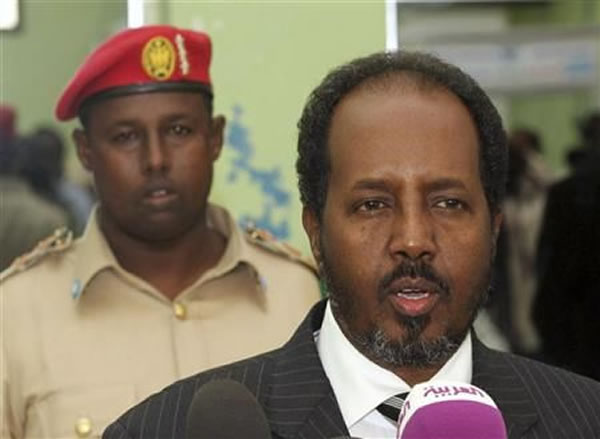
By Mohamed Ahmed
 |
| Somalia's President Hassan Sheikh Mohamud
|
Hassan Sheikh Mohamud three weeks ago fully backed a U.N. ban imposed in February aimed at cutting off funds to Islamist militants, but said he changed his mind after hearing from local Somalis.
"The U.N. and the Somali government banned the export of charcoal. But we considered the logical requests of the Somalis," Mohamud told reporters in Mogadishu late on Wednesday.
"It is impossible to reverse charcoal to trees. Somalis have invested cash and sacrificed time with this charcoal. However, no trees can be burned for charcoal," he said.
Residents and regional officials said charcoal was already being loaded onto ships at the southern port of Kismayu, al Shabaab's last major urban redoubt which it lost to African peacekeepers and forces loyal to Mogadishu six weeks ago.
Some Kismayu residents say that during al Shabaab's four-year rule over the city charcoal became an important driver of the local economy, which had become largely crippled by more than two decades of civil conflict.
The charcoal - an estimated three to five million sacks worth tens of millions of dollars - has become a growing source of tension for Mohamud, who is trying to extend his new government's authority beyond the capital and stabilise the south.
The Security Council's Monitoring Group on Somalia and Eritrea, an independent panel that reports on compliance with U.N. sanctions, says charcoal exports from southern Somalia in 2011 generated over $25 million for al Qaeda-linked al Shabaab.
Security Council diplomats have said the council is divided on the issue. Envoys say some countries fear the Kismayu merchants lobbying for the sale of the charcoal may still have connections to al Shabaab; Washington has indicated it would agree to the charcoal exports if the Somali government approved.
A Security Council envoy in New York said the U.N. response to Mohamud's comments "might be one for the lawyers". U.N. sanctions regimes allow for the possibility of exemptions.
(Additional reporting by Abdi Sheikh in Mogadishu and Louis Charbonneau at the United Nations; Writing by Yara Bayoumy; Editing by Richard Lough and Sonya Hepinstall).
Source: Reuters
No comments:
Post a Comment